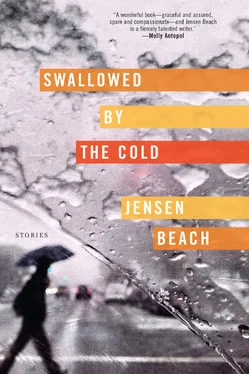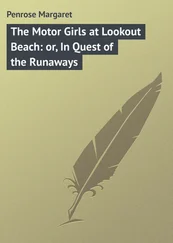Jensen Beach
Swallowed by the Cold: Stories
For Out of the Heart Proceed
For Anna
and
for N, T & E
It is still beautiful to hear the heartbeat
but often the shadow seems more real than the body.
— Tomas Tranströmer (trans. Robert Bly)
In the village of Elmsta, which straddles the mainland and an island about two hours north of Stockholm, there is an uneven asphalt tennis court, veined with cracks and loosely traversed by a shoddy net. It was on this court that Rolf Strand played the best tennis of his life. He lost the first set, but came back to win the next three by an average margin of four games. His opponent — an aging former tennis professional whose prosthetic left arm made a swishing whistle whenever he hit from his backhand — twice broke Rolf’s serve, but Rolf was hitting well to both sides and ran the tennis pro to exhaustion. Rolf was happy about this. Who can say how the tennis pro felt? He had only recently lost an arm.
In the canal behind the court, boats waited for a drawbridge to rise. The pilots and passengers of these boats looked up at the bridge impatiently in spite of the nice weather. His summerhouse was on the eastern shore of the island across a small stand of deciduous trees from a family who had twice invited Rolf to dinner and who, he suspected, must have been Buddhists because they were so kind. On his way home from the courts, Rolf rode his bicycle onto the bridge and stopped at its center. He looked at his watch. The leather strap was pliable with sweat. It was twenty minutes of the hour and he felt good. His racket was strapped to the back of his bicycle and did not cause him trouble. He looked down at a sailboat that had come to a stop where the canal narrows to a single lane. Large digital clocks mounted on either side of the bridge notified the boats of the current waiting time. At O’Mally’s in Gamla stan, where Rolf had taken a young woman named Karin Johansson on a date nearly fifty years before, a similar clock counted down the minutes remaining until St. Patrick’s Day. Karin Johansson died, he remembered reading in the newspaper, in 1988 or 1989.
Facing north, as this sailboat was, he knew it was possible to glimpse, just past the stubby outcropping of rock where the village ends, the open sea. There were nineteen minutes on the clock. If he pedaled hard, he could take the path that ran parallel to the canal out to the Baltic and beat the sailboat to the headland. It would be a simple victory, but still the thought pleased him. It was that kind of day. He hadn’t permitted himself to celebrate after his defeat of the former tennis pro and felt somehow cheated by his restraint. His self-control was born out of respect for his opponent’s accomplishments, but also the hope that the former tennis pro would agree to a rematch. A second victory might carry him through the two long weeks during which his daughter Matilda and her children would come to visit, as they did every year. These visits caused Rolf significant anxiety about his daily rituals and the various ways his family encroached upon them.
The canal path was rocky and rutted by horse and motorbike use. He considered taking the road instead. That morning he’d placed seven bottles of imported beer in a net, which he strung over the side of his sailing dinghy into the cold water of the inlet across the narrow road from his house. They were by now without a doubt sufficiently chilled. The road would bring him to these beers in the shortest amount of time. But the road was frequently traveled, making it dangerous for bicycles; and, if he decided to take the canal path, he could easily turn due east at its end, walk along a half mile of forest trail, and then bike up a stretch of fire road that ended behind his house. It was a picturesque route. There were sixteen minutes on the clock. He decided to take the path.
The day his second child was born — a boy whom he named Lennart — Rolf walked the canal path in the snow and admired the ice in the canal and the natural beauty of life and barren trees and the storm that had prevented him from driving into Stockholm to witness the birth. He was thinking about this day as he rode the path. The tennis racket shook. He and Lennart had never been close, and he began, as he often did following moments of great pride, to wonder if everything terrible about his life was his own fault. Lennart was back in Stockholm now after five years abroad. He worked for Ericsson first in Morocco then in North Carolina, where Rolf had twice visited. Rolf decided, as he passed a young pine into which someone had carved the crude image of a penis, to call Lennart that afternoon. He planned to grill a fish for his dinner and might, he thought now, give Lennart a call when he was minding the grill with a cold beer in his hand. Lennart’s new number was on a notepad by the telephone. Maybe he would invite Lennart to visit the Mamma Andersson exhibit at Moderna Museet.
He tried to refocus his thoughts on his victory over the former tennis pro by listing as best he could remember the former tennis pro’s professional achievements. This, he hoped, would bring him back to an appreciation of his victory and away from the regret he felt regarding his son. He thought of the former tennis pro’s three consecutive semifinal appearances at the French Open; he remembered the first of these well. Two years into the open era, it was the year his mother, Agneta, died and he’d occupied his grief with an obsessive interest in the Swede’s progress in the tournament. He’d spent many afternoons at his summerhouse staring at the light-green wallpaper on the kitchen wall, listening to the matches on the little radio he kept above the sink. There had also been good showings at a tournament in London, and he’d beat Rod Laver in a five-set match in Massachusetts in 1967 that was two minutes short of tying the record for longest championship match in the pre — open era.
Rolf swerved to avoid a deep furrow in the path. The momentum of the bicycle pressed him hard to the right. He leaned to his left. The bicycle wobbled. There was a rock in the middle of the path. He tried to avoid the rock, but the bicycle leaned in the wrong direction and Rolf found himself headed straight for the rock as if he’d been summoned to it. A strum of tension plucked the spokes. He thought he heard himself give a little scream. He flew over the handlebars and landed with a splash in the canal.
The canal was shallow. Rolf struck the bottom with his head. He tumbled around in the water, grabbing for the surface but touching only the ground. He’d once visited California and could now hear the voice of the lifeguard who taught him to swim in the turbulent Pacific. “Keep calm. Reach slowly for the surface.” His toes grazed the rocky bottom. With two paddling sweeps of his arms, he was near enough to the shore to stand. When he did, he felt at once a considerable pain above his left eye. He put his hand to his forehead, and then brought it down to eye level. Watery blood dripped from his fingers. When he flossed his teeth, his gums tended to bleed. He touched his head again and found a large gash about a couple of centimeters above his eyebrow. The wound continued across the ridge of his temple and then turned sharply downward, where it widened to the size of his fist at the sphenoid. He pressed lightly here and, though his fingers were cold and numb, he was sure he felt smooth bone. His eye hurt. “Dammit,” he said.
Again he touched the wound and again, bringing his hand down to eye level, he examined the blood on his fingers. The blood was darker. It clung to his fingers like mucus and crept slowly down his arm. His cheek tickled and when he stuck his tongue out, he could taste warm blood collecting in the coarse hair of his mustache, which he had only recently regrown. He began to feel faint. He stepped through the water to the rock-lined shore and climbed up to dry land. There, he removed his shirt and pressed it onto the wound. Then he sat down. Water and blood ran down his face.
Читать дальше











